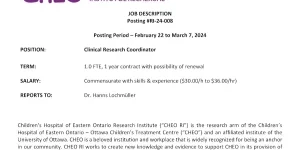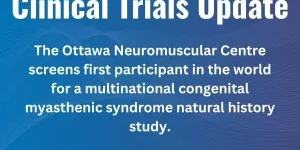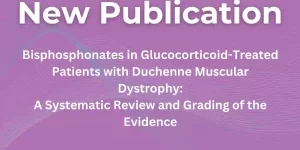New Publication: Analysis of the functional capacity outcome measures for myotonic dystrophy
Being able to accurately and reliably asses functional capacity in people with myotonic dystrophy type 1 (DM1) is paramount to monitor disease progression and assess the effects of therapeutic interventions. However, this can be problematic when patients have differing severities of symptoms, ages of onset, body compositions, and sex. For these reasons, the international ‘outcome measures for myotonic dystrophy (OMMYD)’ project was launched in 2011 to help select the most appropriate outcome measures to be used for monitoring patients. The research performed here, part of Dr. Jimenez-Moreno’s PhD work, aimed to asses the feasibility, reliability, and validity of the proposed outcome measures, and monitor how the patient cohort progressed over the space of a year. The publication made a number of recommendations for using these outcome measures in clinical trials, as well as providing reference values for future research.
A number of funding organisations contributed to this work including the National Institute of Health Research (NIHR) Rare Disease Translational Research Collaboration, the Medical Research Council, the Wellcome Trust, The Wyck Foundation, Consejo Nacional de Ciencia y Tecnología, the Barbour Foundation, Newcastle upon Tyne Hospitals NHS Foundation Trust, and University College London Hospitals NHS Foundation Trust.
Read the full open access article here.
Abstract
Objectives: Defining clinically relevant outcome measures for myotonic dystrophy type 1 (DM1) that can be valid and feasible for different phenotypes has proven problematic. The Outcome Measures for Myotonic Dystrophy (OMMYD) group proposed a battery of functional outcomes: 6-minute walk test, 30 seconds sit and stand test, timed 10 m walk test, timed 10 m walk/run test, and nine-hole peg test. This, however, required a large-scale investigation.
Methods: A cohort of 213 patients enrolled in the natural history study, PhenoDM1, was analyzed in cross-sectional analysis and subsequently 98 patients were followed for longitudinal analysis. We aimed to assess: (1) feasibility and best practice; (2) intra-session reliability; (3) validity; and (4) behavior over time, of these tests. Results: OMMYD outcomes proved feasible as 96% of the participants completed at least one trial for all tests and more than half (n = 113) performed all three trials of each test. Body mass index and disease severity associate with functional capacity. There was a significant difference between the first and second trials of each test. There was a moderate to strong correlation between these functional outcomes and muscle strength, disease severity and patient-reported outcomes. All outcomes after 1 year detected a change in functional capacity except the nine-hole peg test.
Conclusions: These tests can be used as a battery of outcomes or independently based on the shown overlapping psychometric features and strong cross-correlations. Due to the large and heterogeneous sample of this study, these results can serve as reference values for future studies.







